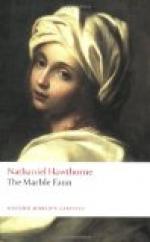“The lamp, Signore?” answered the man, without at first troubling himself to look up. “The lamp that has burned these four hundred years! How is it possible, Signore, that it should not be burning now?” “But look!” said the sculptor impatiently. With good-natured indulgence for what he seemed to consider as the whim of an eccentric Forestiero, the Italian carelessly threw his eyes upwards; but, as soon as he perceived that there was really no light, he lifted his hands with a vivid expression of wonder and alarm.
“The lamp is extinguished!” cried he. “The lamp that has been burning these four hundred years! This surely must portend some great misfortune; and, by my advice, Signore, you will hasten hence, lest the tower tumble on our heads. A priest once told me that, if the Virgin withdrew her blessing and the light went out, the old Palazzo del Torte would sink into the earth, with all that dwell in it. There will be a terrible crash before morning!”
The stranger made the best of his way from the doomed premises; while Kenyon—who would willingly have seen the tower crumble down before his eyes, on condition of Hilda’s safety—determined, late as it was, to attempt ascertaining if she were in her dove-cote.
Passing through the arched entrance,—which, as is often the case with Roman entrances, was as accessible at midnight as at noon,—he groped his way to the broad staircase, and, lighting his wax taper, went glimmering up the multitude of steps that led to Hilda’s door. The hour being so unseasonable, he intended merely to knock, and, as soon as her voice from within should reassure him, to retire, keeping his explanations and apologies for a fitter time. Accordingly, reaching the lofty height where the maiden, as he trusted, lay asleep, with angels watching over her, though the Virgin seemed to have suspended her care, he tapped lightly at the door panels,—then knocked more forcibly,—then thundered an impatient summons. No answer came; Hilda, evidently, was not there.
After assuring himself that this must be the fact, Kenyon descended the stairs, but made a pause at every successive stage, and knocked at the door of its apartment, regardless whose slumbers he might disturb, in his anxiety to learn where the girl had last been seen. But, at each closed entrance, there came those hollow echoes, which a chamber, or any dwelling, great or small, never sends out, in response to human knuckles or iron hammer, as long as there is life within to keep its heart from getting dreary.
Once indeed, on the lower landing-place, the sculptor fancied that there was a momentary stir inside the door, as if somebody were listening at the threshold. He hoped, at least, that the small iron-barred aperture would be unclosed, through which Roman housekeepers are wont to take careful cognizance of applicants for admission, from a traditionary dread, perhaps, of letting in a robber or assassin. But it remained shut; neither was the sound repeated; and Kenyon concluded that his excited nerves had played a trick upon his senses, as they are apt to do when we most wish for the clear evidence of the latter.




